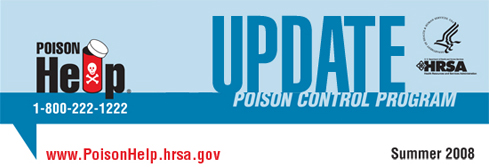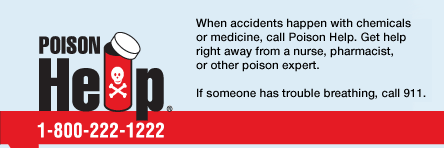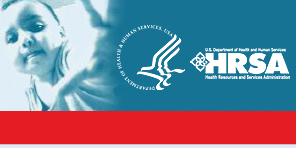 |
 |


Summer Tips
As the weather warms and we spend more time outside, families face
new risks. Here are some tips to avoid poisonings that occur most often
in the summer:
- Be sure that everyone in your family can identify
poison ivy, poison oak, and poison sumac. Remember, "leaves of
three, let it be." If someone touches one of these plants, rinse
right away with plenty of running water for at least five minutes.
- Poisonous mushrooms often grow in yards and parks.
Only experts can tell poisonous mushrooms from safe mushrooms.
- Use a thermometer when cooking and reheating
foods. That will help you to know when they are safe to eat.
Call Poison Help (1-800-222-1222) to reach the poison center and local
poison expert serving your area. View
a complete list of summer poison prevention tips.
Poison Help launches digital advertising campaign
The newly redesigned Poison Help campaign,
which launched in March, has enjoyed great success with its online advertising
campaign. Four brand new digital advertisements were designed for Poison
Help, and have been airing since March on sites like WebMD, USAToday.com,
AOL, and Yahoo!.
The advertising campaign has been extremely successful. After the first
full month of the advertising campaign, nearly three million people have
been exposed to the ads, and hundreds of thousands watched the spots in
their entirety. During Poison Prevention Week and through the first full
month of the advertising campaign, the new Poison Help Web site received
thousands of hits per week. Many of the viewers who were exposed to the
ads made their way to the Web site to seek more information.
The Poison Help advertising campaign will continue through 2008. View
all four digital ads.
back to top
Toll-free number blunder
You may have noticed a typo in the Spring edition of the HRSA Poison Control
Program newsletter. The national Poison Help number to reach poison control
centers was erroneously recorded as 1-800-222-1212 in one location. This
number is often mistakenly listed as the national number to access poison
control centers. Our error does afford us the opportunity to encourage
those who come across the number listed incorrectly to try to have the
listing changed locally. The actual national Poison Help number is 1-800-222-1222.
Thank you to those that brought this blunder to our attention. We apologize
for any confusion this may have caused. We have edited the Spring edition
and the final version is now located at PoisonHelp.hrsa.gov.
back to top
EPA "Play it Safe" Campaign
The latest data collected from the American Association of Poison Control
Centers reports an estimated 70,000 calls annually involving children's
exposure to common household pesticides. The U.S. Environmental Protection
Agency (EPA) is committed to raising public awareness about ways to prevent
pesticide poisonings, and promote safe use and storage of household pesticide
products. In support of these efforts, the EPA has developed a suite of
educational materials specifically designed for parents and caregivers.
The "Play It Safe" campaign provides useful, family-friendly
information about what parents can do to minimize the risks associated
with exposure to household pesticides. The campaign materials include:
• Play It Safe: Reduce Your Child's Chances of Pesticide Poisoning
(EPA-735-K-07-003) available in English and Spanish
• Poison-proof Your Home: One Room at a Time
(EPA-735-F-07-010) available in English and Spanish
To order copies, visit The
National Service Center for Environmental Publications Web Site  ,
or call at 1-800-490-9198. ,
or call at 1-800-490-9198.
back to top
Poison control centers in the literature
The following two articles on poison control centers have been published
recently in the professional literature
Zaloshnja, E., Miller, T., Jones, P.R., Litovitz,
T., Coben, J., Steiner, C., & Sheppard, M. (2008).
The impact of poison control centers on
poisoning-related visits to EDs, U.S. 2003.
The American Journal of Emergency Medicine, 26 (3), 310-315.
For 14 US States, 2003 State hospital data, emergency
department (ED) data, and poison control center (PCC) call data were examined
to determine the relationship between nonfatal non-admitted ED rates for
poisoning and PCC call volume. This county-level analysis used a log-normal
regression model. For every 15.5 human exposure calls to PCCs, one non-admitted
ED visit is prevented. This study also showed a PCC benefit-cost ratio
of 1.4, inferring that PCC spending is associated, although perhaps not
causally, with a $205 net cost savings in medical spending.
Bunn TL, Slvova S, Spiller HA, Colvin J, Bathke A, Nicholson
VJ.
The Effect of Poison Control Center Consultation on
Accidental Poisoning Inpatient Hospitalizations with Pre-Existing Medical
Conditions.
J Toxicol Environ Health (part A) 2008;71:283-288
For the period, 2000-2004, probabilistic data linkage
was used to link 6,249 hospitalized cases of unintentional poisoning with
3,068 reported poison control center (PCC) records for hospital-admitted
accidental poisoning in Kentucky. Linkage variables, used to show that
the hospital consulted with the PCC about the case, consisted of age,
gender, hospital, and date of admission/poisoning. Controlling for age
and sex, poisoning cases that had a PCC consult and no preexisting medical
condition had on average a shorter length of stay in the hospital and
lower average total charges, while poisoning cases with no PCC consult
and preexisting medical conditions had on average a longer hospital length
of stay and higher average total charges. This study shows that PCC consultation
has a positive effect on total charges and length of stay regardless of
preexisting medical conditions.
back to top
the.Medic series focuses on teen prescription drug
abuse
The White House Office of National Drug Control Policy reported this past
January that more teens abuse prescription drugs than any illicit drug
other than marijuana. According to the report, more than 2.1 million teenagers
abused prescription drugs in 2006.
MacNeil/Lehrer Productions is developing the.News, an in-school news broadcast
for high school and middle school students and teachers that will emphasize
21st Century learning objectives. the.News will include a regular health
awareness feature called the.Medic.
As part of the development process they have collaborated with the National
Association of School Nurses  to create a prototype. The series includes five videos, each roughly four
minutes long. Four reports are for students, the fifth for parents. The
videos are accompanied by lesson plans with curriculua appropriate for
middle and high school students in the subject areas of science and language
arts. The curriculum and video features can be found on the Website www.macneil-lehrer.com/thenews.
http://www.pbs.org/newshour/thenews/themedic/
to create a prototype. The series includes five videos, each roughly four
minutes long. Four reports are for students, the fifth for parents. The
videos are accompanied by lesson plans with curriculua appropriate for
middle and high school students in the subject areas of science and language
arts. The curriculum and video features can be found on the Website www.macneil-lehrer.com/thenews.
http://www.pbs.org/newshour/thenews/themedic/
For further information and questions about this material contact Lisa
Denny at ldenny@newshour.org.
back to top
Poison session presented at annual STIPDA/CDC meeting
The 2008 Joint Annual Meeting of State and Territorial Injury Program
Directors Association and Centers for Disease Core State Injury Grantees
was held April 20-23 in Oklahoma City, Oklahoma. The meeting included
a dedicated session on poisoning issues. This session featured ideas for
partnering with poison control centers for prevention, a look at the results
of surveillance activities in Texas, and a discussion around the proper
disposal of medicine. The session closed with a discussion of prevention
and surveillance activities being conducted by an interdisciplinary, multi-agency
Poison Workgroup. Speakers were:
- Barbara Singer, HRSA Poison Control Program, "Public
Health - Something to Talk About With Poison Control Centers"
- Marcia Becker, Texas Department of State
Health Services, "Intentional Poisoning Exposures Reported to the
Texas Poison Control Center"
- Melissa Heinen, Northern New England Poison Center,
"Prevent Poisonings - Get Rid of Old Medicines! Just Don't Ask
Us How"
- Monique Sheppard, HRSA's Poison Center Technical
Assistance Resource Center
Archives of these presentations and others from the
STIPDA/CDC Meeting are available at the State
and Territorial Injury Program Directors Association Web site 
back to top
Technical Assistance Spotlight
HRSA's Poison Center Technical Assistance Resource Center (PC TARC)
works with PCCs in a variety of areas, including strategic planning, program
evaluation, meeting facilitation, marketing programs, organizational development
and health education. Recently, PC TARC worked with the Northern New England
Poison Center (NNEPC) as they created a brochure on "Medication:
What You Need to Know" with the New Hampshire State Committee on
Aging. The NNEPC developed the content for the brochure in conjunction
with its partners and asked PC TARC to assist with design, layout, graphics,
format, and providing camera-ready files for the printer.
The final brochure was released in March 2008 and can be seen on the NNEPC
Web site at www.nnepc.org. Feel free to visit the Web site and to contact
the PC TARC or NNEPC staffs with questions or comments on the brochure.
Thank you to Melissa Heinen and Karen Simone for their permission to share
this brief description with readers of this newsletter.
To reach PC TARC staff, please e-mail pctarc@pire.org or call 301-755-2800,
ext. 1.
back to top
April designated as National 9-1-1 Education
Month
Congress designated April 2008 as National 9-1-1 Education Month,
recognizing the importance of 9-1-1 education. Eight national organizations,
called the Coalition for 9-1-1 Education, have joined together to advance
9-1-1 education: E9-1-1 Institute; National Emergency Number Association
(NENA); 9-1-1 For Kids; National Association of State 9-1-1 Administrators;
Association of Public-Safety Communications Officials International; CTIA
- The Wireless Association; 911 Industry Alliance; and COMCARE Emergency
Response Alliance. They are calling upon public safety officials, schools,
government officials, and industry leaders to engage in a national effort
to educate children, seniors, and the general public about the importance
of, and appropriate use of, 9-1-1. For more information visit The
E9-1-1 Institute Web Site  . .
HRSA's Poison Control Program participates in meetings with NENA on the
issue of Voice Over Internet Provider (VOIP) and cell phones as they relate
to accessing the nation's emergency telephone systems. An effort is underway
to enhance the current 9-1-1 system in order to appropriately route incoming
calls from VoIP and cell phones. HRSA works to ensure that the national
Poison Help line, 1-800-222-1222, is considered an emergency telephone
number and that access to poison centers on this number is just as critical
as access to 9-1-1.
For more information on HRSA's involvement with NENA and the routing of
the Poison Help line (1-800-222-1222), please contact Maxine Jones at
301-443-6192.
back to
top
Pediatric drug studies provide improved dosing
Published online February 29, 2008
PEDIATRICS Vol. 121 No. 3 March 2008, pp. 530-539
Legislation passed over the last decade has resulted in a significant
increase in the number of pediatric studies conducted to evaluate the
safe and effective use of drugs in pediatric patients. The study, "Improving
Pediatric Dosing Through Pediatric Initiatives: What We Have Learned,"
reviewed pediatric drug studies for 108 products submitted to the Food
and Drug Administration from July 1998 through October 2005. The authors
were interested in the impact increased pediatric drug trials have made
on drug labeling and dosing for children. They concluded that these studies
have resulted in significant changes in pediatric drug labeling and unique
pediatric dosing recommendations. These changes have created more concise
drug labeling, allowing physicians to prescribe more beneficial dosages,
while reducing the risk of harmful or ineffective results. The authors
conclude that a long-term commitment, starting early in drug development,
to gaining knowledge regarding pediatric patients is of utmost importance
for developing therapies in this unique and vulnerable patient population.
back to top
EX® smoking cessation campaign launches
nationwide
A new public health campaign, funded by an alliance of national
organizations and State health agencies, launched on March 31st in Washington,
D.C. The program, called EX®, aims to change the way smokers think
about the difficult process of quitting, and guide them to valuable free
resources to build a successful quit attempt.
This new public education effort will encourage smokers to approach quitting
smoking as "re-learning life without cigarettes." EX will educate
smokers through advertisements on television, radio and online and via
out-of-home promotions. The program also offers smokers a new Web site,
www.BecomeAnEX.org, which features action-oriented tools and information
to help smokers prepare for quitting by developing a personalized plan,
as well as a virtual community, where smokers can share stories and best
practices about their quit attempts.
The American Legacy Foundation®, the national public health foundation
best known for its truth® youth smoking prevention campaign, spearheaded
the EX® campaign.
back to top
Visit
the Adobe Reader Web site and follow the instructions to download
the appropriate version of Adobe Reader for your operating system.
back to top
|
 |
 |
 |

![]()
|



